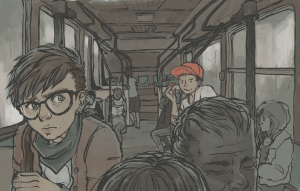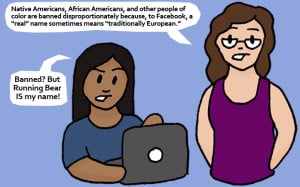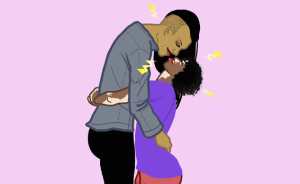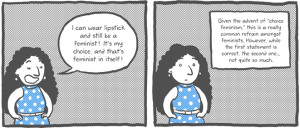
Credit: Carleton
My parents’ work are their identities. Among my extended family and immigrants that I have met throughout my life, job titles affect social status and community recognition.
While striving to prove that the American dream is valid, that what we risked our lives for is real, we created a hierarchy of survival in job titles.
I remember at one point the fastest cherry picker was looked up to, then the person who tended the orchards and didn’t pick fruit, and then the person who got the fuck out of the orchards.
I worked alongside my parents as a kid. I had no option but to work to have new clothes each school year, I don’t remember a summer without work since moving to the US.
I didn’t take a vacation until I was in my mid 20’s and grew up associating myself, my worth with work.
So when I started writing and drawing comics as a kid, I was overcome with guilt at the thought of being an artist.
I still struggle with that today. I relate to what Trinh T. Minh-ha writes in her book, Women Native Other, “many people refer to [the bohemian artist] when they say the writer’s activity is ‘gratuitous’ and useless’….has no definite market value.”
That belief kept me in the closet as a writer until my early twenties.
Since then I have been figuring out how to follow my dreams regardless of the guilt that I have for wanting to live as a writer when it does not guarantee status or a regular paycheck.
I am not fully living off of my art yet. I wanna be transparent that as I write this, I’m writing out a commitment, a plan and putting out my dream into the world.
I do, however, want to pass on some tips and advice that were given to me by various people in my life that help me today.
1. Establish Values
When I spit my first poem and noticed that people really responded, I got hella egotistical for a second.
It was like, “damn I could really get some cute dates doing this.” But then a mactivist (activist poet who used their status to get booty) hit on me, and I was like “nawww not doing that.”
I started developing my values. Some of my values are to prioritize making my writing accessible to many people as possible; to challenge the accepted narratives of queer people of color, trans guys, immigrants, poor folks, and chronically ill folks; and to strive for humility.
That means that I don’t let my ego get bigger than my dreams and I remember where I come from always.
2. Surround Yourself with Support
I didn’t share my writing with anyone until I was in my teens and wouldn’t have done it without the support of a very rad theater teacher.
Since then, I have created the most when I’m encouraged and surrounded by care.
I have made it a priority to spend my time with people who help me grow as a person and challenge me to grow as a writer too. My close network of friends and support are folks who keep my values in check with me and aren’t afraid to check me when I am being problematic.
Having a community of support has also been helpful for the times I am sick for long periods of time (I am chronically ill) and need help to make ends meet. Having unreliable income is hard especially in the beginning.
3. Believe in Yourself and Put Yourself Out There
“The artists you look up to began where you are,” one of my mentors has said this to me several times.
I’m not alone when I think that good artists get offered opportunities left and right, but I’ve found by being in artist communities that this isn’t true.
We gotta put in work to be seen and also apply for gigs as they become available.
But this is complicated for us brown folks because as Junot Diaz puts it, “Economies of attraction continue to resemble, more or less, the economy of attraction of white supremacy.”
This greatly impacts the visibility of marginalized writers since most visible artists are white.
When I first made a commitment to be a poet, I jumped on opportunities to read my writing at school, open mics, and fundraising events. I then started seeking out opportunities to get published.
I searched online for “queer people of color submissions” and applied to a few. I have since then tried to apply every few months to something new.
Now I also have a blog that I update regularly with current projects and contact info for gigs.
I work to keep myself and my work visible because there are few places in the mainstream poetry scene that fit my values.
4. Understand Your Worth
I know that in order to survive today, I gotta participate in capitalism. My values are still important as is being financially accessible for small organizations.
For that reason my workshops and poetry reading feels are on a sliding scale. In order to establish this system, I had to turn to friends from similar class backgrounds and talk it out.
I know that I can change my fees as my financial situation shifts and I can also choose not to charge if I really want to volunteer my time.
5. Practice Saying No
And recognize saying no doesn’t have to be about rejection. It can be about loving people, honoring values, and knowing that it may not be realistic to take on something new right now.
I think about my body and whether I am making enough time between traveling to let my body recover and also how traveling will impact my connection to my folks and family.
I am a co-parent too and I can’t be out of town all the time. Being realistic about time is really important which gets into the next tip.
6. Keep a Planner
Because building relationships (and as an artist, every gig is a relationship) requires follow through, showing up, and consideration.
7. Write Often and Edit
Writing daily has benefitted me in a lot of ways. It’s a commitment to myself and has helped me let go of unrealistic expectations about being an artist including the idea that good artists make everything right the first time.
I have learned to edit a practice in forgiveness while changing the mistakes I made.
I say write often because I know that not everybody has the ability or energy to write daily. I know that there is voice recording software out there to help folks with different disabilities but they are not affordable or easy to use.
Writing daily has worked for me and I switch between long hand and my computer to save stressing out my wrists and joints.
8. Don’t Compare Yourself To Other Artists…Ever
Instead create more shit because comparing can turn into hating on artists who are hustling just as hard as you are.
I am not saying lie about liking artists. Just notice where your judgment or comparisons come from and if they are motivated by internalized oppression.
Recognize jealousy, envy and idolization and talk about it with support. This shit kills creativity and community.
9. Redefine Success
For me, success is about creating art, poetry, writing that does not water down my values, culture, or purpose.
I have had to create my own idea of success because the idea of success we are raised to uphold devalues all the ways I am powerful.
I gain my power and love of storytelling from learning about the history of my peoples and how we have survived colonization and many forms of erasure.
10. Help Others Shine
In order to combat how internalized oppression turns us against each other, I work to help other artists shine.
I stay connected to fellow artists and take time to compliment them on their work. I share the spotlight that I have in community to introduce new artists or give thanks to artists that have inspired me.
This tip has been the most healing. I build skills as an artist, work on humility. and also use my status to help another artist get to where I am.
It’s beautiful.
Currently I’m a student, living off of some loans, scholarships and a part time job as a Co-Director of Bent Writing Institute. I started getting paid for doing workshops a few years back and could not be where I am without the support and love of my community.
Along the way, I have come against obstacles from being a marginalized artist and ego blows from submitting work and not getting published or being told to apply next year.
Part of reaching out to support and connecting with other immigrant queer artists is to work through the fear of not doing my family’s migration justice – that by choosing to be an artist, I’m letting down my parents by choosing a path with no market value or status.
I feel worried that I’m choosing a life of poverty (the poor poet) and when this fear takes over I turn to my close friends and immigrant artist community to remind me of my dreams and help me to keep going.
Honestly, I don’t know what will happen in the future. But much like my parents who packed up their belongings and left an established community to follow a dream in el Norte, I too follow my dream to write and honor their stories.
Fabian Romero is a Contributing Writer for Everyday Feminism. They are a Two Spirit Queer Chicano poet, blogger, and community organizer. Their sincere poetry and stories stem from their experiences as an Economic Refugee, speaking two languages, Queerness, and working as a migrant laborer. They perform poetry and facilitate anti-oppression and self care workshops.
Search our 3000+ articles!
Read our articles about:
Our online racial justice training
Used by hundreds of universities, non-profits, and businesses.
Click to learn more




















